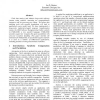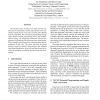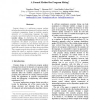166 search results - page 15 / 34 » Type-Dependence Analysis and Program Transformation for Symb... |
ICLP
1997
Springer
13 years 11 months ago
1997
Springer
We provide a method whereby, given mode and (upper approximation) type information, we can detect procedures and goals that can be guaranteed to not fail (i.e., to produce at leas...
SCAM
2002
IEEE
14 years 12 days ago
2002
IEEE
Tools that analyze and enhance large-scale software systems using symbolic reasoning are computationally expensive, and yet processors are cheap. We believe that enabling tools wi...
WORDS
2003
IEEE
14 years 23 days ago
2003
IEEE
The execution time of software for hard real-time systems must be predictable. Further, safe and not overly pessimistic bounds for the worst-case execution time (WCET) must be com...
PASTE
2005
ACM
14 years 1 months ago
2005
ACM
Program instrumentation, inserted either before or during execution, is rapidly becoming a necessary component of many systems. Instrumentation is commonly used to collect informa...
ASWEC
2005
IEEE
14 years 1 months ago
2005
IEEE
Program slicing is a well-known program analysis technique that extracts the elements of a program related to a particular computation. Based on modular monadic semantics of a pro...



